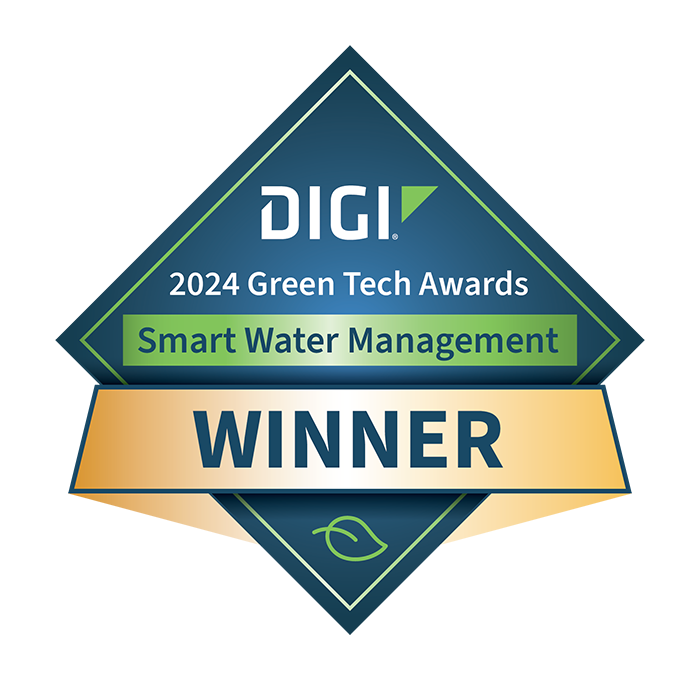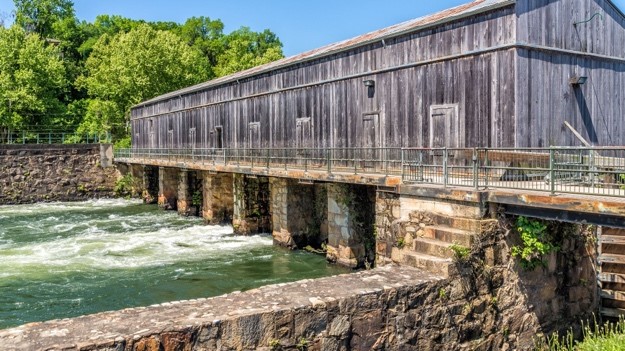 The Augusta Utilities Department of Augusta, Georgia provides water and sewer service across 230 square miles for a population of more than 160,000. That distribution system encompasses approximately 1,200 miles of water mains. Digi Connect® Sensor+ helps the utility keep a careful eye on this vital infrastructure, bringing intelligence, visibility, and efficiency to the crucial monitoring and maintenance processes that keep service at the highest possible levels, while protecting the environment.
The Augusta Utilities Department of Augusta, Georgia provides water and sewer service across 230 square miles for a population of more than 160,000. That distribution system encompasses approximately 1,200 miles of water mains. Digi Connect® Sensor+ helps the utility keep a careful eye on this vital infrastructure, bringing intelligence, visibility, and efficiency to the crucial monitoring and maintenance processes that keep service at the highest possible levels, while protecting the environment.
Keeping Things Flowing
 In Georgia’s state capital, the Augusta Utilities Department (AUD) oversees a vast water and sewer infrastructure for the state’s second-largest city. The department provides residents and businesses with potable water drawn from both the Savannah River and dozens of groundwater wells. It also processes sewage in water-treatment plants that arrives from 80 lift stations.
In Georgia’s state capital, the Augusta Utilities Department (AUD) oversees a vast water and sewer infrastructure for the state’s second-largest city. The department provides residents and businesses with potable water drawn from both the Savannah River and dozens of groundwater wells. It also processes sewage in water-treatment plants that arrives from 80 lift stations.
In addition to treating and filtering tens of millions of gallons of water each day at five different treatment plants, the department must also carefully monitor many miles of sewer mains and more than 20,000 manhole covers. But when waters reach flooding stages or stormwater surges, the Augusta Utilities water team must identify and address the trouble spots as quickly as possible and take quick action to remediate the issues.
According to Stephen Orton, Augusta’s Maintenance Superintendent, there are two primary culprits that lead to blockages and disruptions. “Grease — especially in cold weather — is a constant challenge in our manholes,” he explained. “We need to monitor those thousands of locations and react when there is any backup or other issue. The problem was that we weren’t seeing problems before they occurred. We’d only know we had a problem after service was disrupted. You’d need X-ray vision to see the posts where impending trouble was building.”

Moving from Reactive to Proactive
To meet that challenge, and spot potential trouble before it spills over into the streets, Orton wanted to deploy a centrally administered system to remotely monitor key locations and facilities throughout the municipality — without having to send teams. “We wanted a solution that would be smart, affordable, and easy to maintain,” he said. “But our evaluation also focused on cost, ruggedized construction, and durability. Manholes are surely one of the most difficult environments for deploying wireless tech, and we weren’t sure how long the units would last under those adverse conditions.”
AUD turned to Digi Connect® Sensor+ and Digi Remote Manager® to gather and transmit real-time data from manholes across the municipality. Digi Connect® Sensor+ is a fully integrated, battery powered cellular gateway with I/O for connecting to a wide range of external sensors. Designed to work in rugged industrial environments, Connect Sensor+ is an excellent solution for companies looking to add remote monitoring and diagnostics in places where power is not easily available. The Digi Remote Manager platform automates the deployment, monitoring, and management of thousands of devices from a single point of command.
“We love the battery-powered design and cellular connectivity,” Orton said, “as well as the affordable price tag. Digi also helped us set up the Manufacturing Procedure Qualification Test (MPQT). And with Digi Remote Manager, we can provision Connect Sensor+, define reports, and send alerts. Whenever a problem arises, Digi Remote Manager issues a text to our team.”
Early Detection Minimizes Problems in Sewer Manholes
Presently, Augusta uses Digi Connect Sensor+ in 25 separate higher-risk locations using cellular connections that average $25/month for 2 GB of data. Antennas reside just beneath manhole covers so connections have been strong and reliable — and since the data is cloud-resident, the system doesn’t break any of AUD’s cybersecurity rules.
“We didn’t want to deploy a solution in every single manhole — we’re starting with the trouble spots,” said Orton. “Our sensors are 2.5 V DC sensors. We’re going four to five months before we need to replace a battery — that’s longer than we expected.”
The initial implementation involves monitoring levels of water and sewage to provide AUD with early warnings about potential overflows. Subsequently, the agency has begun to deploy chemical dispensers to break up clogs and grease buildup in manholes. Separate sensors are tracking chemical inventories as well. In addition to monitoring manhole sites AUD is also adding Digi Connect Sensor+ to pressure relief valves to further help prevent overflows. All of these initiatives have a positive outcome on the city’s environment, sustainability and responsiveness to issues that can have a negative impact on the local environment.
“We sample the data every five minutes and transmit the data every hour — it’s less than 1 MB per transmission,” Orton said. “That data goes into AVEVA Insight a cloud-based solution to manage operations and assets for GIS mapping and trending. If it detects a critical situation, Digi Remote Manager will issue an alarm to give us an early warning. This helps prevent or minimize environmental damage and streamline the reporting that’s required for incidents.”
Moving forward, the utility is considering sensor deployments in wastewater treatment plants. “We have industrial customers who can inadvertently send contaminated wastewater,” Orton explained. “If we can monitor pH readings and notify our plants that they might be receiving bad material, they can treat the water sooner and more effectively. It also helps us identify the source of the contaminations.
“In the future, we’re considering a similar system to help us monitor trash cans and dumpsters to prevent overflows.”
Environmental Standards Compliance
An important factor in the work of Augusta Utilities is ensuring water safety, both for the population of Augusta as well as for the environment. From systems design to daily operation, the organization complies with the Minimum Standards for Public Water Systems, as published by the Georgia Environmental Protection Division.
This means taking measures such as ensuring there is no physical connection between a potable water supply and a questionable water supply (including private water wells) which could allow possibly contaminated water to enter the potable water system.
It also means taking active precautions to prevent things like discharge of surface water, groundwater, well water, runoff, subsurface drainage, swimming pool drainage into sanitary sewer systems. All of these efforts prevent contaminants in Augusta’s water systems and support environmental stewardship.
Next Steps